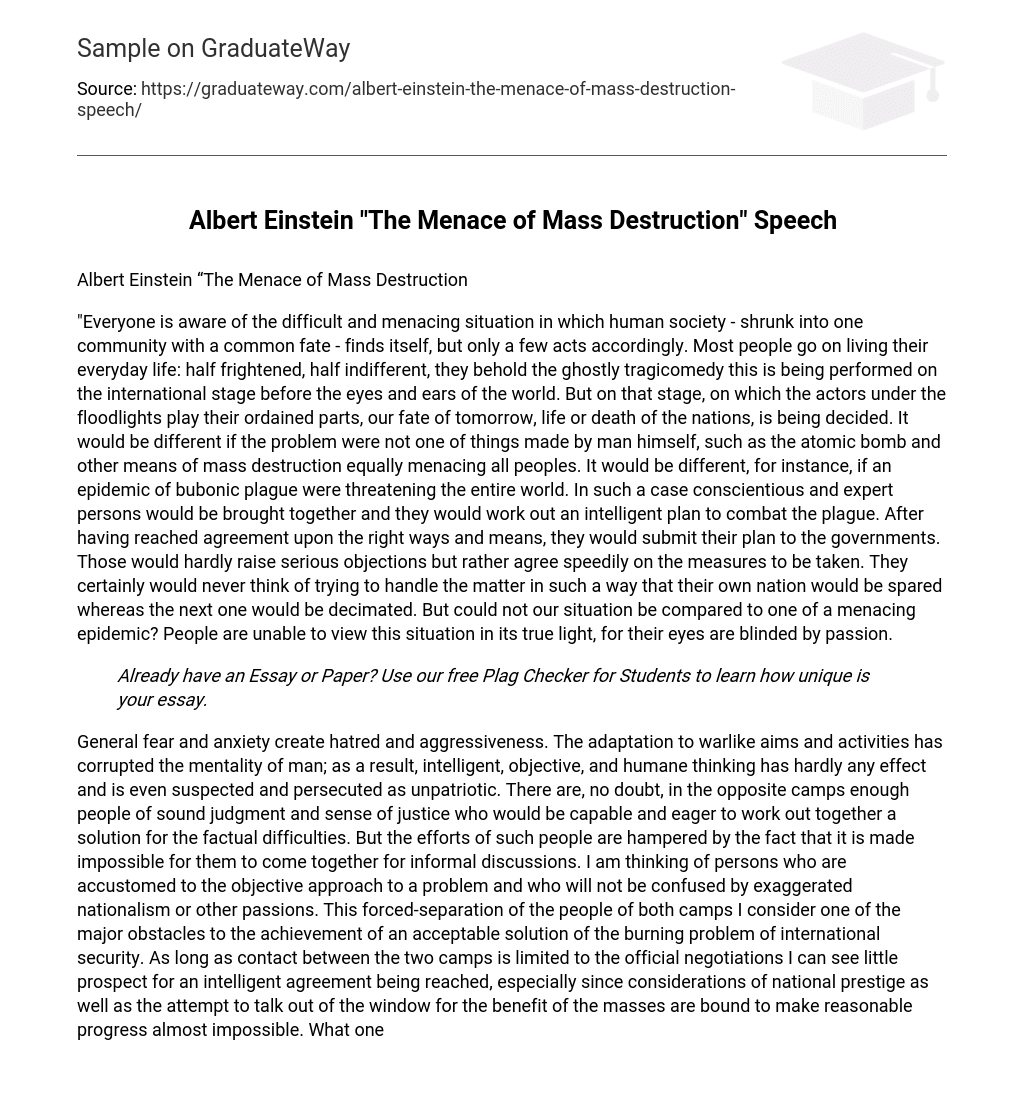Albert Einstein “The Menace of Mass Destruction
“Everyone is aware of the difficult and menacing situation in which human society – shrunk into one community with a common fate – finds itself, but only a few acts accordingly. Most people go on living their everyday life: half frightened, half indifferent, they behold the ghostly tragicomedy this is being performed on the international stage before the eyes and ears of the world. But on that stage, on which the actors under the floodlights play their ordained parts, our fate of tomorrow, life or death of the nations, is being decided. It would be different if the problem were not one of things made by man himself, such as the atomic bomb and other means of mass destruction equally menacing all peoples. It would be different, for instance, if an epidemic of bubonic plague were threatening the entire world. In such a case conscientious and expert persons would be brought together and they would work out an intelligent plan to combat the plague. After having reached agreement upon the right ways and means, they would submit their plan to the governments. Those would hardly raise serious objections but rather agree speedily on the measures to be taken. They certainly would never think of trying to handle the matter in such a way that their own nation would be spared whereas the next one would be decimated. But could not our situation be compared to one of a menacing epidemic? People are unable to view this situation in its true light, for their eyes are blinded by passion.
Already have an Essay or Paper? Use our free Plag Checker for Students to learn how unique is your essay.
General fear and anxiety create hatred and aggressiveness. The adaptation to warlike aims and activities has corrupted the mentality of man; as a result, intelligent, objective, and humane thinking has hardly any effect and is even suspected and persecuted as unpatriotic. There are, no doubt, in the opposite camps enough people of sound judgment and sense of justice who would be capable and eager to work out together a solution for the factual difficulties. But the efforts of such people are hampered by the fact that it is made impossible for them to come together for informal discussions. I am thinking of persons who are accustomed to the objective approach to a problem and who will not be confused by exaggerated nationalism or other passions. This forced-separation of the people of both camps I consider one of the major obstacles to the achievement of an acceptable solution of the burning problem of international security. As long as contact between the two camps is limited to the official negotiations I can see little prospect for an intelligent agreement being reached, especially since considerations of national prestige as well as the attempt to talk out of the window for the benefit of the masses are bound to make reasonable progress almost impossible. What one party suggests officially is for that reason alone suspected and even made unacceptable to the other.
Also behind all official negotiations stands – though veiled – the threat of naked power. The official method can lead to success only after spade-work of an informal nature has prepared the ground; the conviction that a mutually satisfactory solution can be reached must be gained first; then the actual negotiations can get under way with a fair promise of success. We scientists believe that what we and our fellow men do or fail to do within the next few years will determine the fate of our civilization. And we consider it our task untiringly to explain this truth, to help people realize all this is at stake, and to work, not for appeasement, but for understanding and ultimate agreement between peoples and nations of different views. “I pledge allegiance to the Earth, and to the flora, fauna and human life that it supports, one planet, indivisible, with safe air, water and soil, economic justice, equal rights and peace for all.”





